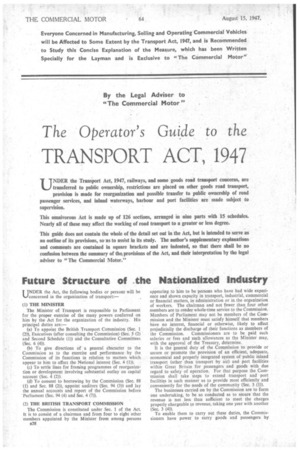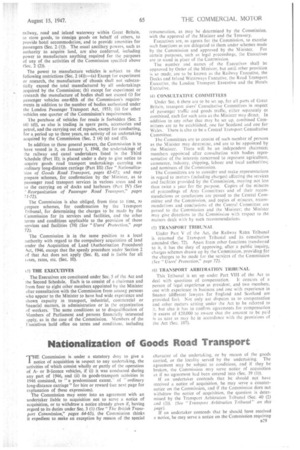Future Structure of the Nationalized Industry
Page 38

Page 39

If you've noticed an error in this article please click here to report it so we can fix it.
UNDER the Act, the following bodies or persons will be concerned in the organization of transport:— (I) THE MINISTER The Minister of Transport is responsible to Parliament for the proper exercise of the many powers conferred on him by the Act for the organization of the industry. His principal duties are:—
(a) To appoint the British Transport Commission (Sec. 1 (2)), Executives (after consulting the Commission) (Sec. 5 (2) and Second Schedule (I)) and the Consultative Committees (Sec. 6 (4)).
(b) To give directions of a general character to the Commission as to the exercise and performance by the Commission of its functions in relation to matters which appear to him to affect the National interest (Sec. 4 (1)).
(e) To settle lines for framing programmes of reorganization or development involving substantial outlay on capital account (Sec. 4 (2)).
(d) To consent to borrowing by the Commission (Sec. 88 (I) and Sec. 88 (2)), appoint auditors (Sec. 94 (3)) and lay the annual accounts and report of the Commission before Parliament (Sec. 94 (4) and Sec. 4 (7)).
(2) THE BRITISH TRANSPORT COMMISSION
The Commission is constituted under Sec. 1 of the Act. It is to consist of a chairman and from four to eight other members appointed by the Minister from among persons 132.8
appearing to him to be persons who have had wide experience and shown capacity in transport, industrial, commercial or financial matters, in administration or in the organization of workers. The chairman and not fewer than four other members are to render whole-time service to the Commission. Members of Parliament may not be members of the Commission and the Minister must satisfy himself that members have no interest, financial or otherwise, likely to affect prejudicially the discharge of their functions as members of the Commission. Commissioners are to he paid such salaries or fees and such allowances as the Minister may, with the approval of the Treasury, determine.
It is the general duty of the Commission to provide or secure or promote the provision of an efficient, adequate, economical and properly integrated system of public inland transport (other than transport by air) and port facilities within Great Britain for passengers and goods with due regard to safety of operation. For that purpose the Commission shall take steps to extend transport and port facilities in such manner as to provide most efficiently and ._conveniently for the needs of the community (Sec. 3 (I)).
The businesses carried on by the Commission are to form one undertaking, to be so conducted as to secure that the revenue is not less than sufficient to meet the charges properly chargeable to revenue, taking one year with another (Sec. 3 (4)).
To enable them to carry out these duties, the Commissioners have power to carry goods and passengers by railway, road and inland waterway within Great -Britain, to store goods, to consign goods on behalf of others, to provide hotel accommodation, and to provide amenities for passengers (Sec. 2. (1)). The usual ancillary powers, such as authority to acquire land, are also conferred, including power to manufacture anything required for the purposes of any of the activities of the Commission specified above ISee. 2 (2)).
The power to manufacture vehicles is subject to the following restrictions (Sec. 2 (4)):—(a) Except for experiment or research, the manufacture of chassis shall not substantially exceed the total manufactured by all undertakings acquired by the Commission; (b) except for experiment or research the manufacture of bodies shall not exceed (i) for passenger vehicles one-fifth of the Commission's requirements in addition to the number of bodies authorized under the London Passenger Transport Act, 1933; (ii) for other vehicles one quarter of the Commission's requirements.
The purchase of vehicles for resale is forbidden (Sec. 2 (4Y (d)), as also is trading in spare parts, accessories and petrol, and the carrying out of repairs, except for conducting, for a period up to three years, an activity of an undertaking acquired by the Commission (Sec. 2 (4) (e) and (1)).
In addition to these general powers, the Commission is to have vested in it, on January 1, 1948, the undertakings of he railway and canal undertakers listed in the Third Schedule (Part II); is placed under a duty to give notice to acquire goods road transport undertakings carrying on ordinary long-distance carriage (Part III) (See " Nationaliza-lion of Goods Road Transport, pages 65-67); and may prepare schemes, for confirmation by the Minister, as to passenger road transport services in various areas and as to the carrying on of docks and harbours (Part IV) (See Reorganization of Passenger Road Transport," pages 71-72).
The Commission is also obliged, from time to time, ru prepare schemes, for confirmation by the "It-ansport fribunal, for determining the charges to be made by the Commission for its services and facilities, and the other terms and conditions applicable to the provision of those services and facilities (76) (See " Users' Protection," page 72).
The Commission is in the same position as a local authority with regard to the compulsory acquisition of land under the Acquisition of Land (Authorisation Procedure) Act, 1946, except that the speedy procedure under Section 2 of that Act does not apply (Sec. 8), and is liable for all taxes, rates, etc. (Sec. 10).
13) THE EXIECUITVES . The Executives are constituted under Sec. 5 of the Act and the Second Schedule. Each is to consist of a chairman and from four to eight other members appointed by the Minister after consultation with the Commission from among persons who appear to the Minister to have had wide experience and shown capacity in transport, industrial, commercial or financial matters, in administration or in the organization of workers. The same conditions as to disqualification of Members of Parliament and persons financially interested apply, as in the case of the Commission. Members of the Executives hold office on terms and conditions, including
remuneration, as may be determined by the Commission; with the approval of the Minister and the Treasury. Executives are, as agents for the Commission, to exercise such functions as are delegated to them under schemes made by the Commission and approved by the Minister. For certain purposes, such as legal proceedings, the Executives are to stand in place of the Commission.
The number and names of the Executives shall be approved by Order of the Minister, but until other provision is so made, are to be known as the Railway Executive, the Docks and Inland Waterways Executive, the Road Transport Executive, the London Transport Executive and the Hotels Executive.
(4) CONSULTATIVE COMMITTEES Under Sec. 6 there are to be set up, for all parts of Great Britain, transport tfsers' Consultative Committees in respect of passenger traffic and goods traffic, either separately or combined, each for such area as the Minister may direct. In addition to any other that may he set up, combined Committees are to he established, one for Scotland and one for Wales. 'There is also to be a Central Transport Consultative Corn mitt eel The Committees are to consist of such number of persons as the Minister may determine, and are to be appointed by the Minister. There will be an independent chairman; members appointed after consultation with bodies representative of the interests concerned to represent agriculture, commerce, industry, shipping, labour and local authorities; and nominees of the Commission.
The Committees are to consider and make representations in regard to matters (including charges) affecting the services and facilities provided by the Commission, meeting not less than twice a year for the purpose. Copies of the minutes of proceedings of Area Committees and of their recommendations or conclusions are passed to the Central Committee and the Commission, and copies of minutes, recommendations and conclusions of the Central Committee are passed to the Commission and the Minister; the Minister may give directions to the Commission with respect to the matters dealt with by such recommendations.
(5) TRANSPORT TRIBUNAL Under Part V of the Act, the Railway Rates Tribunal is renamed the Transport Tribunal and its constitution amended (Sec. 72). Apart from other functions transferred to it, it has the duty of approving, after a public inquiry, charges schemes drawn up by the Commission, providing for the charges to be made for the services of the Commission (See "Users' Protection," page 72).
(6) TRANSPORT ARBITRATION TRIBUNAL This Tribunal is set up under Part VIII of the Act to deal with questions of compensation. It consists of a person of legal experience as president, and two members, one with experience in business and one with experience in finance (different lawyers for England and Scotland are provided for). Not only are disputes as to compensation and other matters arising under the Act to be referred to it, but also it has to confirm agreements for compensation in excess of £20,000 to ensure that the amount to be paid is as near as may be in accordance with the provisions of the Act (See. 107).




















































































